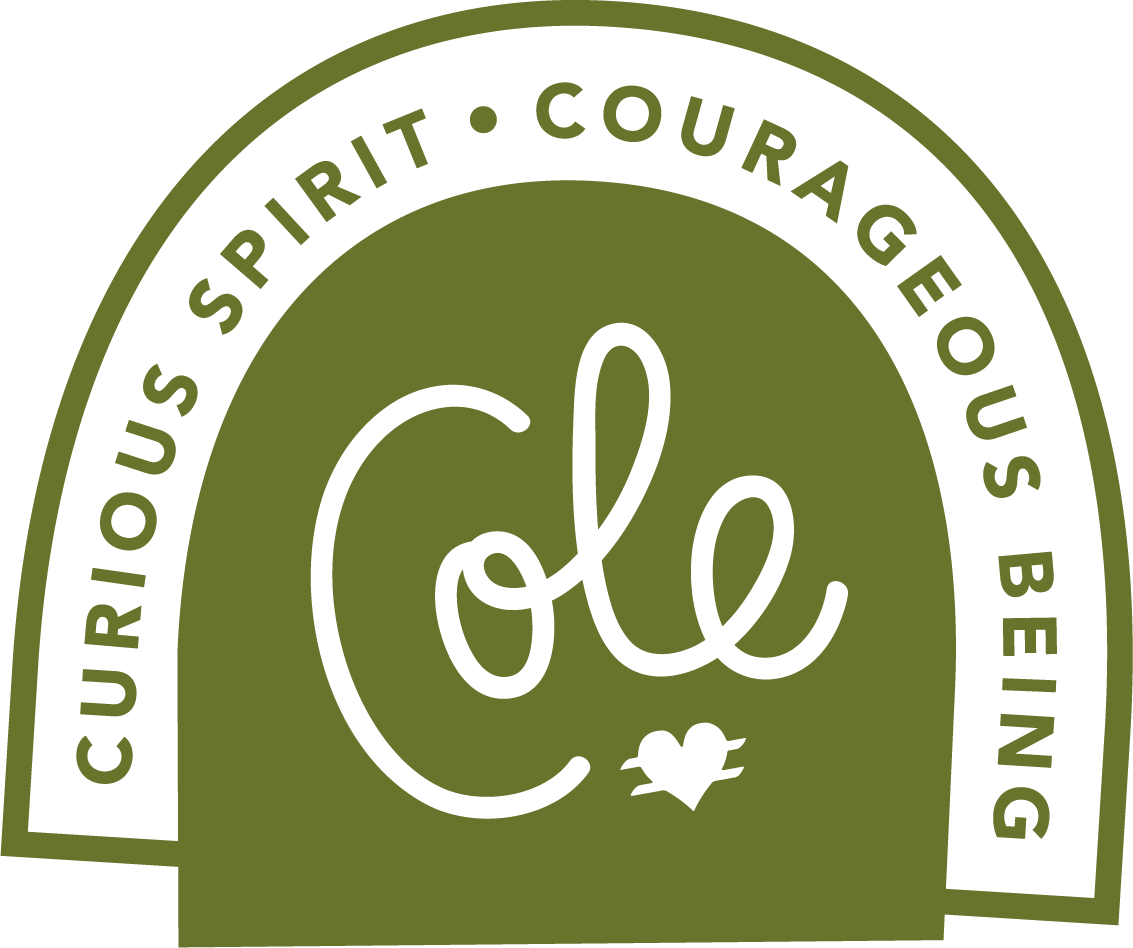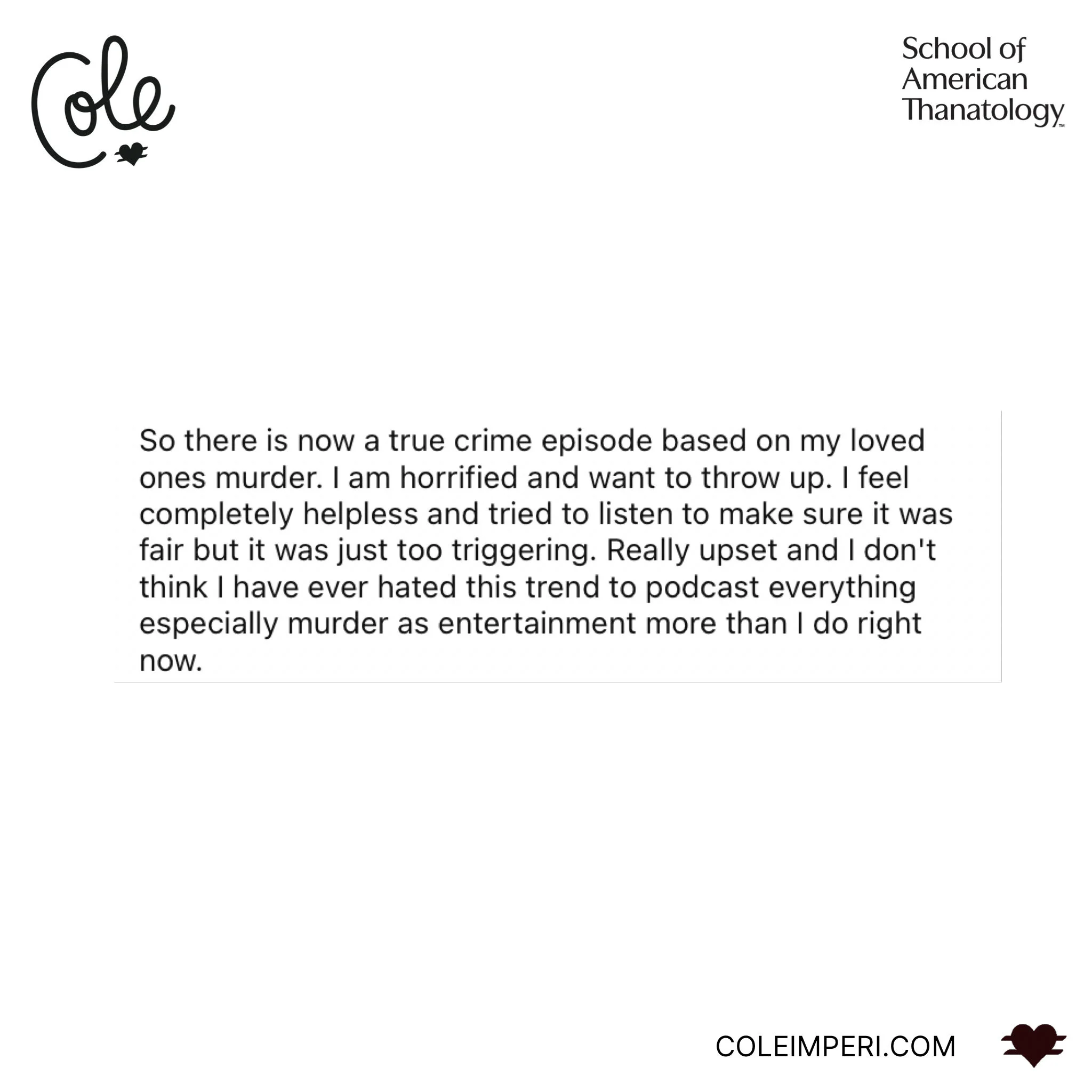The Ethics of Consuming True Crime Media as a Deathworker
As a deathworker, is it ethical for you to consume true crime media? Is it right that you help people ‘have a good death’ while you also consume—as entertainment—stories of terrible deaths? Is it OK to be entertained by a ‘bad death’ only to turn around the next day and help others attain a ‘good death’?
As a deathworker, would you disclose to a family recovering from a murder that you really enjoy listening to details about how other people were murdered? And that you might even be in a Facebook group where you talk about all the gory details?
Well, what if they found out you did? Then what would you do?
This is a piece I’ve always been leery to write because I know how many devoted fans of the true-crime genre are out there. The true-crime media that fans consume is something they look forward to, something that helps them sleep, or something that has kept them company during difficult times. So, I just wanted to put out there that I recognize this, and don’t want to take those good things away from you or make you feel like I am attacking something you love or trying to shame you. And I want to gently request that you do not attack me with misplaced anger. Please! You guys are fierce. I’ve seen it!
This is a piece for those who work with death, dying, grief, loss and bereavement specifically and it’s just me asking you to consider what I’m about to say.
What is a Deathworker?
A deathworker is a term I use to describe anyone who works with death, dying, grief, loss and/or bereavement. You might be a deathworker if you are a death companion, grief counselor, coroner, funeral director, thanatologist, embalmer, cemetery superintendent, crematory operator, hospice nurse, oncologist, chaplain, member of the clergy, or member of your local Chevra Kadisha. If part of your job involves dying, death, grief or bereavement then you are a deathworker.
True Crime Media has a Real Impact on Survivors.
This is the post that came across my phone late one night that motivated me to publish this piece. This is a real post. And this is just one human impacted by the choice to retell (and profit from) other people’s pain.
Ok, let’s jump in. Here’s what I’ve got for you to consider.
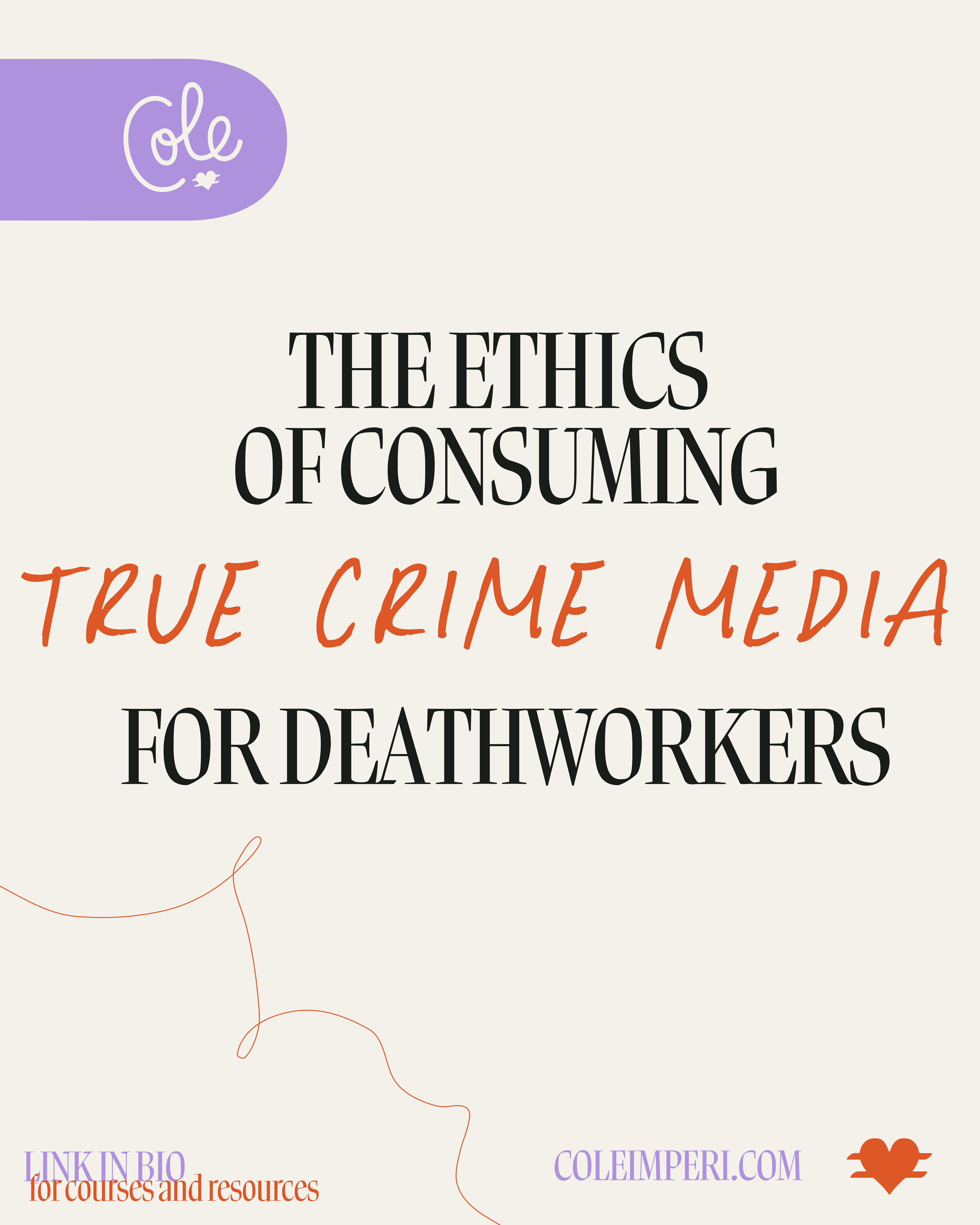
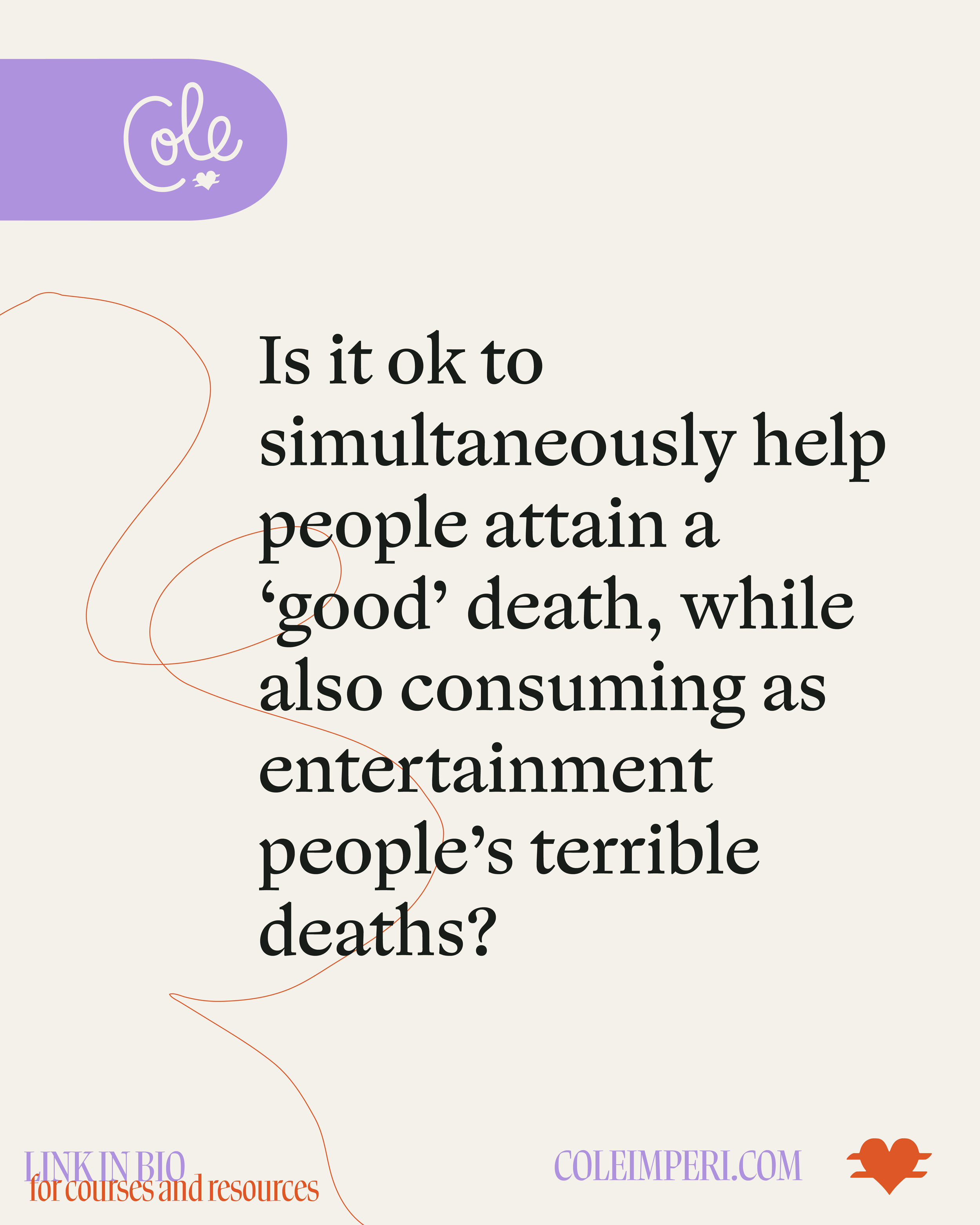
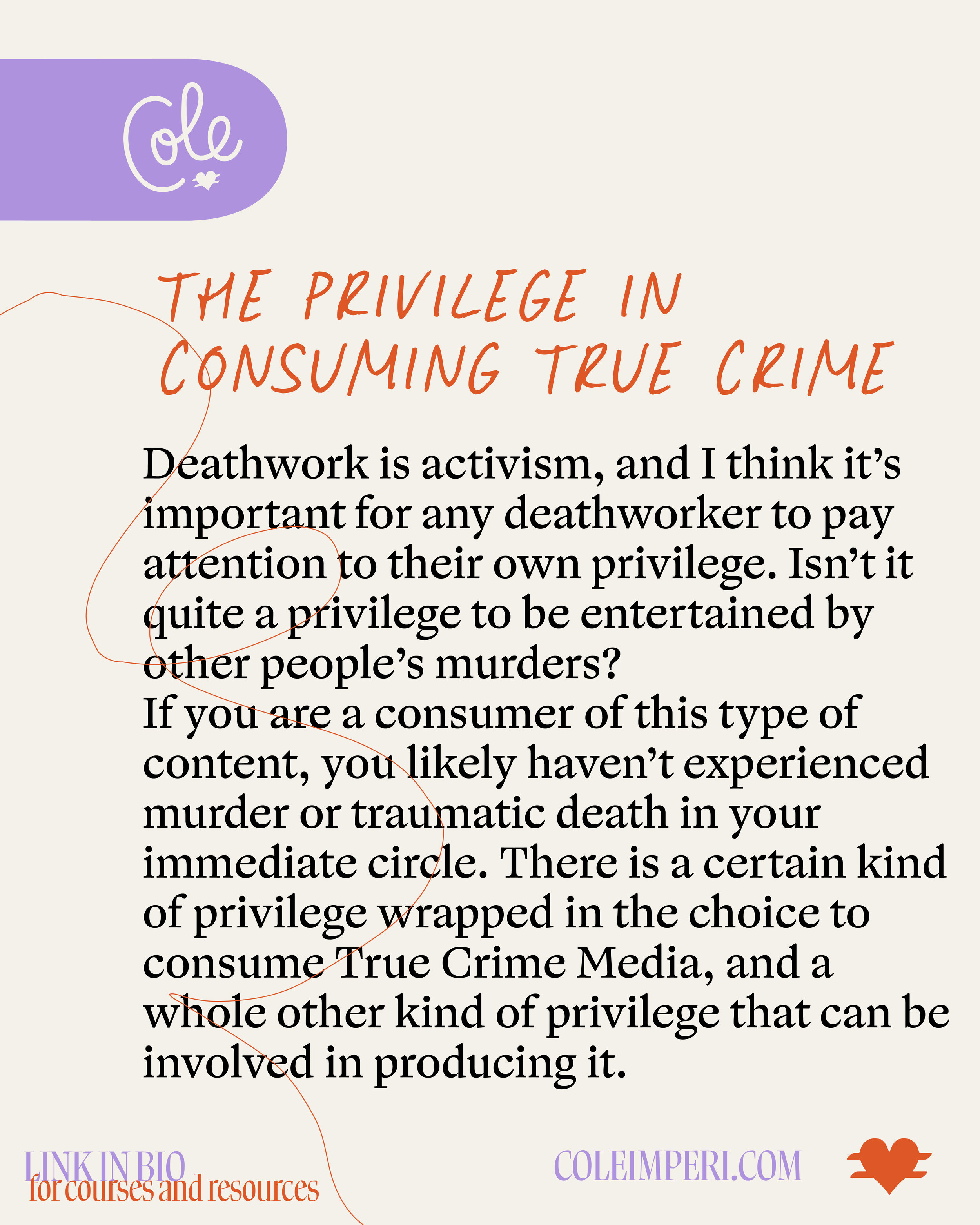
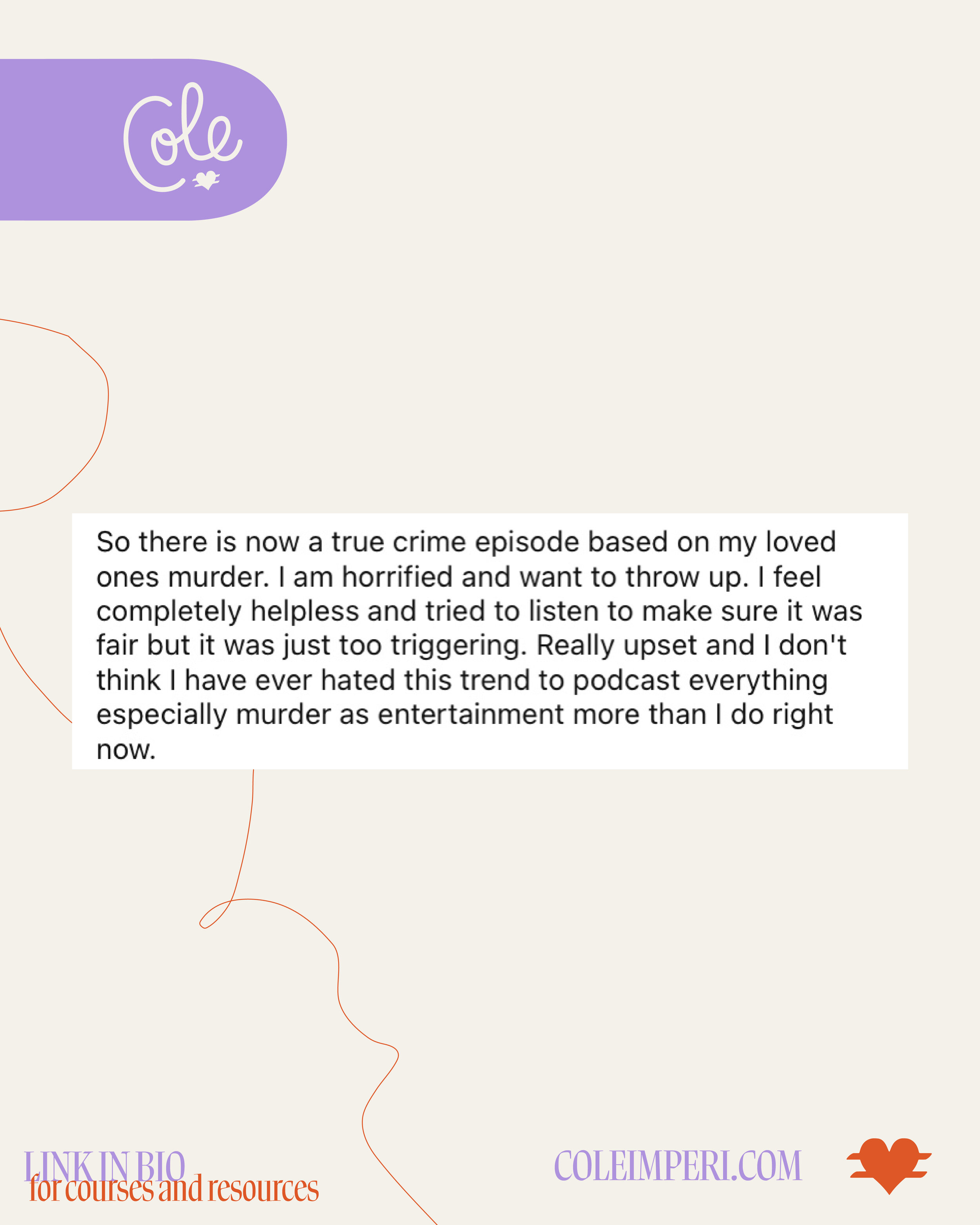
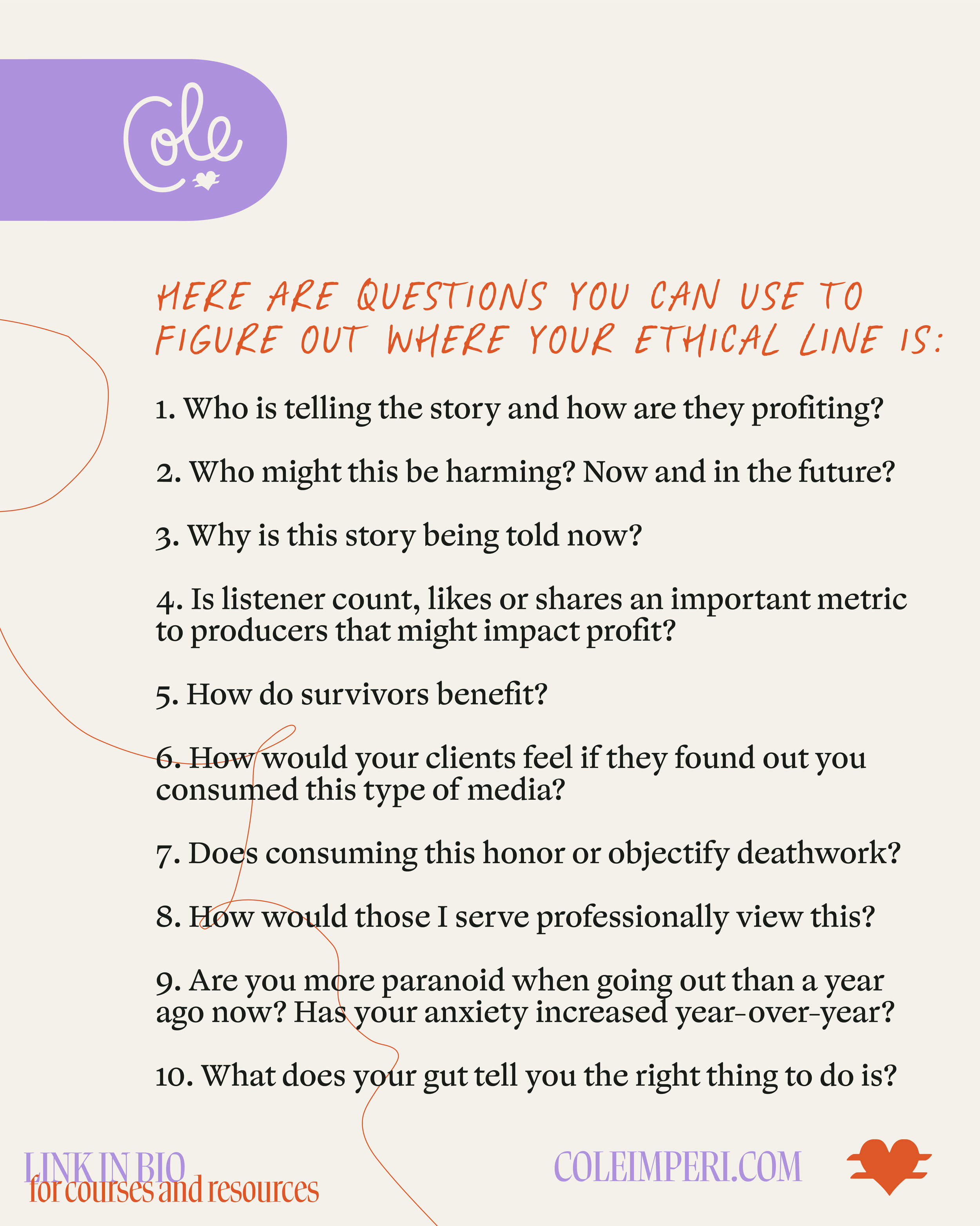
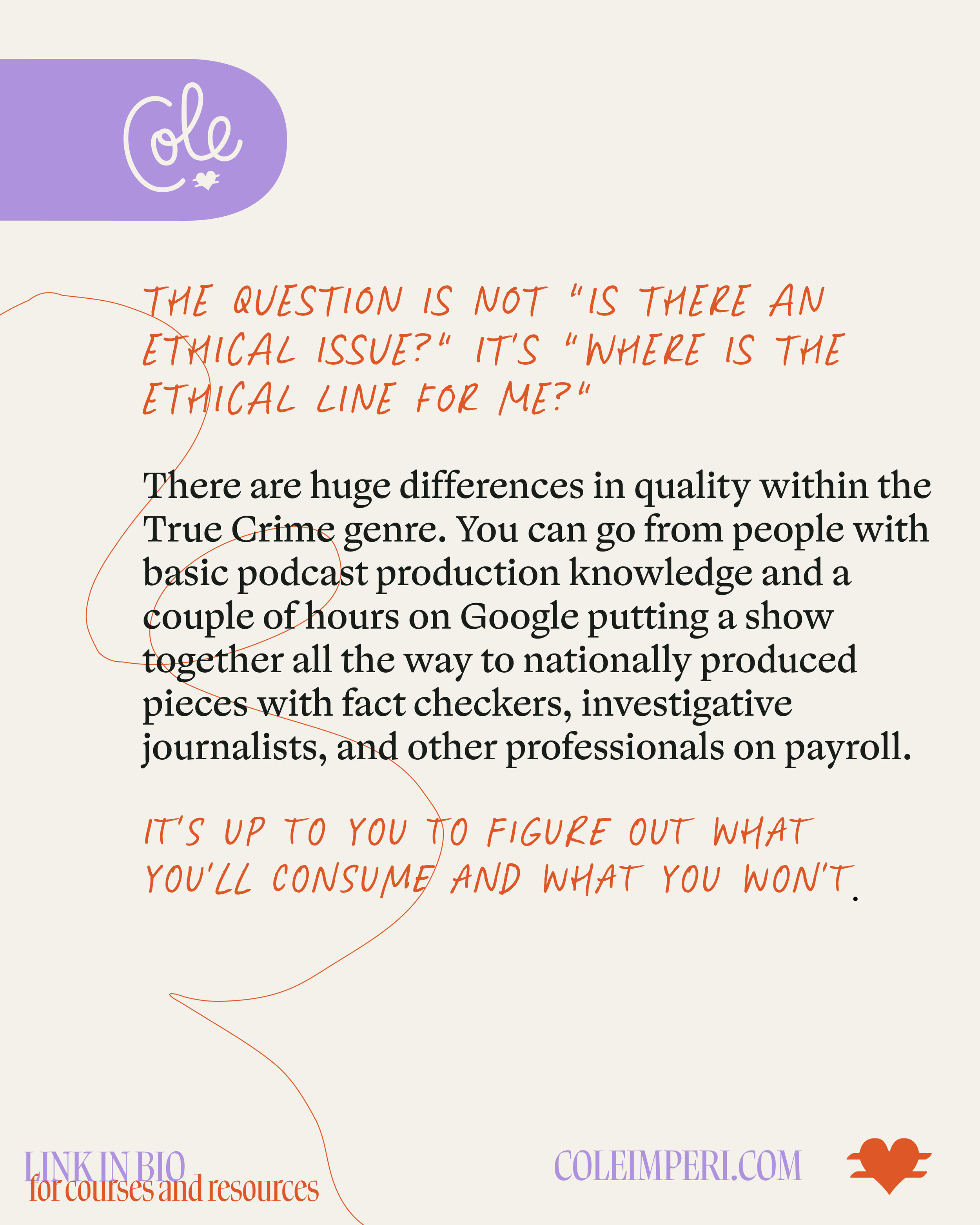
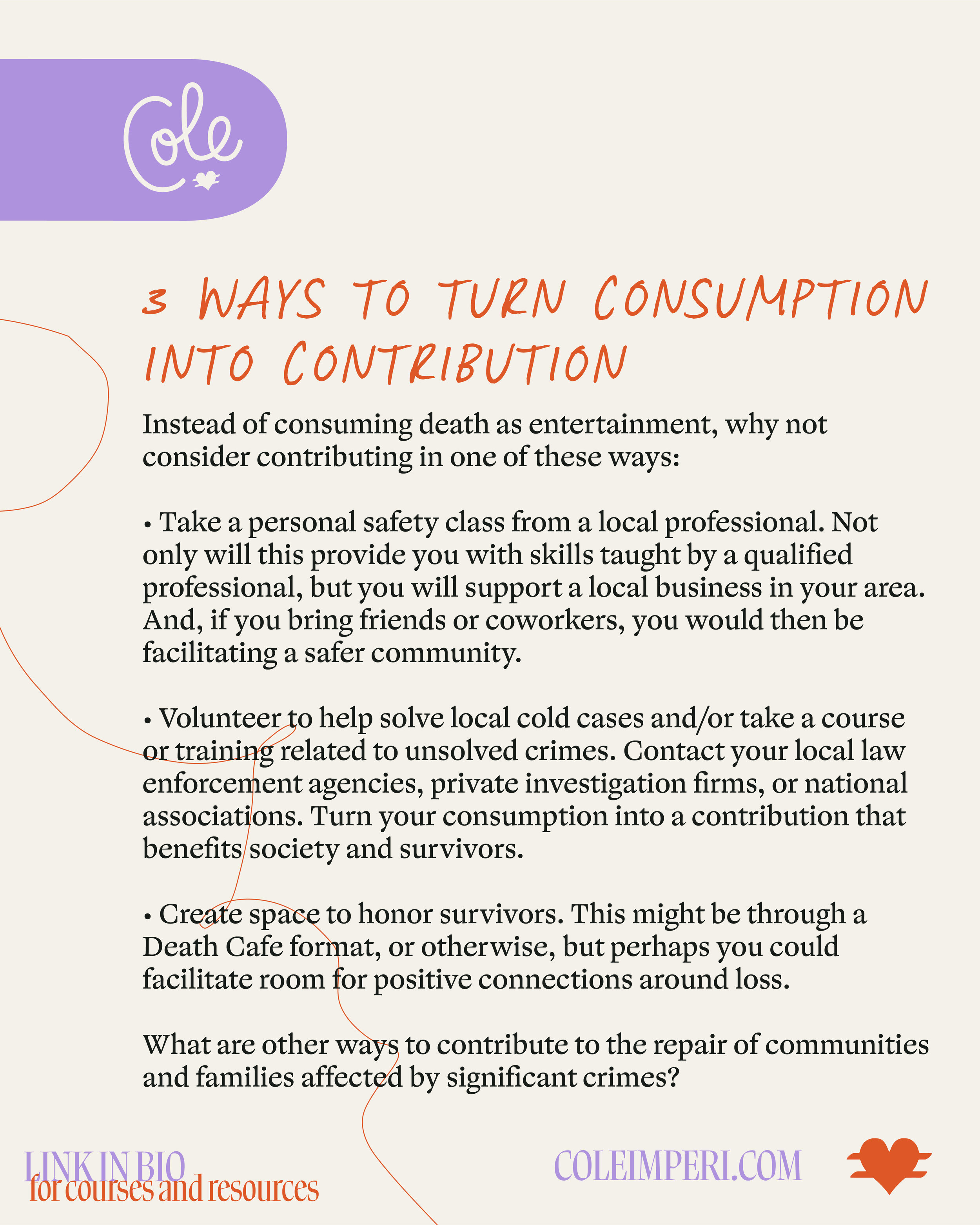
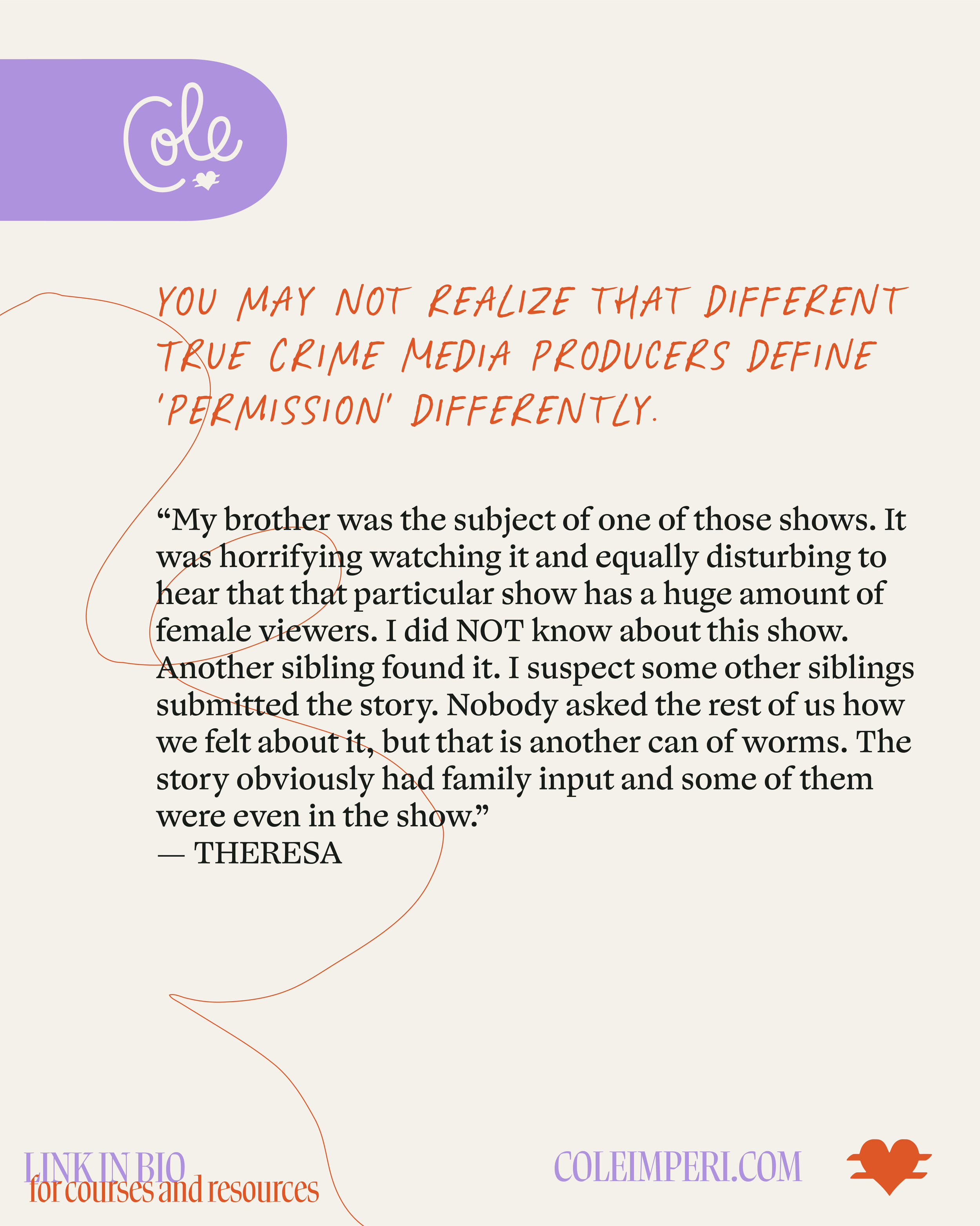
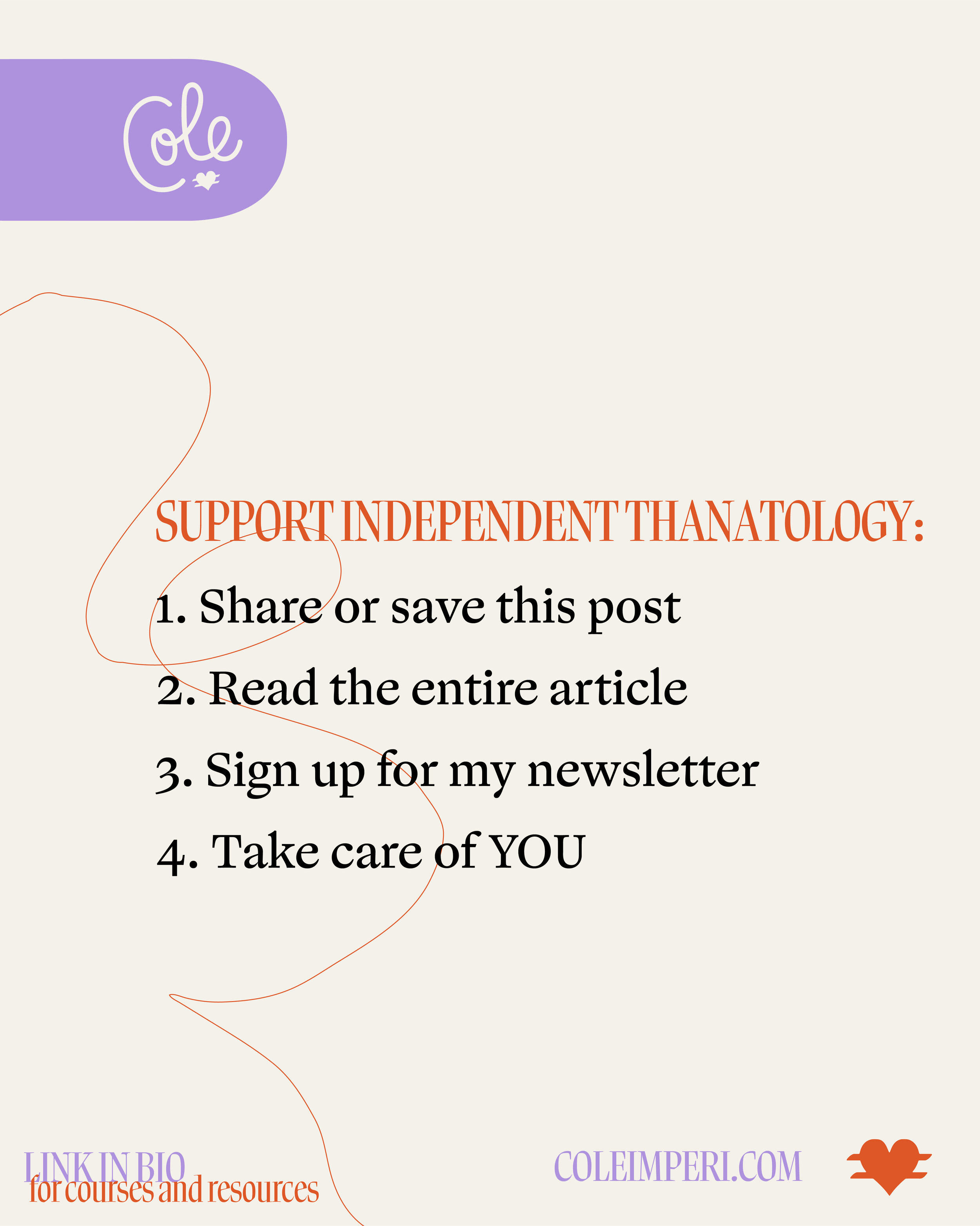
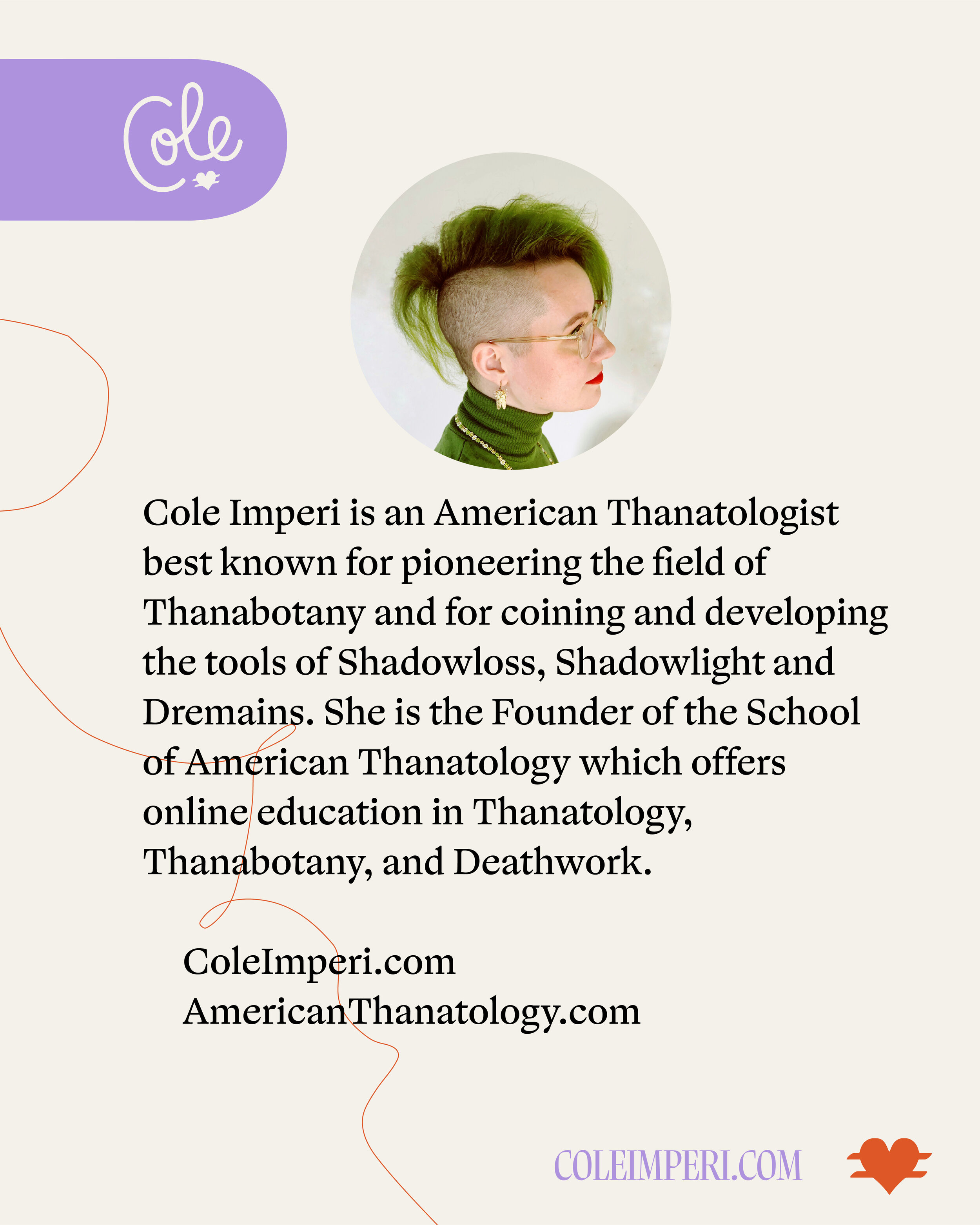
But doesn’t consuming True Crime Media make me safer?
Podcast hosts aren’t safety professionals. And the purpose of the majority of True Crime media is first and foremost entertainment. Put another way, wouldn’t learning from a safety professional be a better idea if you were concerned about safety, rather than from a podcast host?
I understand the argument people make that by listening to these stories of murder and serious crime, listeners have learned additional things to keep a lookout for, and ways to respond (or not respond) in a dangerous situation. I’m even aware of a few examples of people who were actually able to apply things they learned from listening to a true crime podcast that helped them escape a scary situation. What I’m saying is that this could have still been learned but without exploiting victims and their surviving loved ones.
The primary purpose of True Crime Media is not to teach people how to be safe. If it was, it would be called a Self-Defense Class. I find this whole argument to be problematic. It’s similar to someone saying “I learned something about cooking at the grocery store! I don’t just buy food there!” And maybe that’s true, maybe you did learn something about cooking at the grocery store. But also, a grocery store’s primary purpose is getting you to buy food that they sell, and so what you learned about cooking is probably going to have something to do with buying more food. But! If you take a cooking class from a chef, you’ll probably learn how to cook with what you already have, how to buy less, and how to shop smarter.
Another problem with this argument is the victim-blaming mentality inherent within it. In a nutshell, we need to emphasize people not murdering rather than emphasize how victims were stupid, unprepared, or just somehow unsafe. The problem is the murderer, not the victim.
But hasn’t True Crime Media helped solve cold cases?
Yes! That can be true and it can also still be an ethical issue at the same time. And if you really cared about solving cold cases, why aren’t you involved with actually solving cold cases? That is possible and only a Google search away. I will point out here that these cold cases would still get solved by lay individuals without an ethical conflict as a deathworker might have.
But doesn’t True Crime Media only use information that is publicly accessible?
This is a question of exploitation. Not too dissimilar from the discussion happening around ‘mommy bloggers’ and whether using your children’s childhood for profit is ok. After all, can your child really consent to it given the power dynamic between parent and child?
My question is….just because they can, does that mean they should?
But what if the family gives permission?
You may not realize that different True Crime Media producers define ‘permission’ differently. Here is what Theresa shared with me about this very thing:
“My brother was the subject of one of those shows. It was horrifying watching it and equally disturbing to hear that that particular show has a huge amount of female viewers. I did NOT know about this show. Another sibling found it. I suspect some other siblings submitted the story. Nobody asked the rest of us how we felt about it, but that is another can of worms. The story obviously had family input and some of them were even in the show.” –Theresa
So when you justify your True Crime consumption with this argument, let me ask you: Did they really get permission? From who?
Now, there is something I needed to do before being SURE I was going to publish this piece. It was something that absolutely held me back from writing about this before.
Several years ago, I had an extended family member who was murdered. It was very public and was written about in local and regional media outlets across a huge portion of the US for a couple of years. So much information has been published and covered in media outlets that there is definitely enough there for a dramatic and scintillating podcast episode.
So I had to do it, I had to Google their name, the name of the murderer, search all the podcast publishers…..because I know it will happen one day. Someone is going to turn it into a podcast episode. And I’m not immediate family, so I would never be asked for permission. And there are minor children involved who legally can’t be asked for permission.
I truly dread the day I discover that people are being entertained by my family’s trauma. I also am aware that in many True Crime fan groups, people will profess to having a ‘favorite murderer’ or ‘favorite murder.’ I really get sick thinking that someone out there might pick my family member’s murderer as ‘their favorite.’
But I consume True Crime Media because it makes me less anxious.
But does it really? Research shows that regular and repeated exposure to True Crime content can increase anxiety over time and can affect mental health.
I’d also ask you, has your True Crime consumption just given you more things to be scared of or worried about?
Isn’t it important to tell the victim’s story?
As deathworkers, we need to tell our own stories and protect the stories of others. That said, it is absolutely true that in some cases, the stories are being told in the way the victim wants it told. But does that mean there is any less of an ethical issue as it relates to consuming that story as entertainment? And, is the best venue for those stories to be told through the medium of a podcast or web show? Perhaps there are better places for these stories to be told that aren’t deeply connected to likes, shares, and profit. Another issue is that many argue permission can only be granted by the victim as it was their death. So what do we do when the victim is deceased and unable to ‘give permission.’ The argument here is that this is exploiting an unfortunate situation.
There may be consequences to this ‘storytelling’ you haven’t thought of. Let’s talk about Dremains.
Dremains
Imagine this.
It is 10 years from now and Alex is a 6th grader in Cincinnati, Ohio. The class has a unit on family history and the homework assignment is to write a paper on a deceased relative.
Alex types in the name of their uncle and discovers a podcast episode published many years ago, when Alex would have only been about a year or two old.
Alex listens and hears two podcast hosts declare “have we got a murder for you today!”. There is laughter. Upbeat music. And then the story starts.
Alex thought maybe his dead uncle was actually murdered? How dramatic!
No—It turns out that Alex’ Uncle was the murderer in this case. And this was not information Alex was aware of. Perhaps Alex’ family would have liked to tell them when they were old enough. That opportunity has now been taken from the family. And what if Alex’ classmates find out? How might that change the experience of 6th grade for Alex?
I’ll leave my made-up story there, but I have to tell you, it isn’t far off from the truth. People who create this content, or consume it, or write about it….leave all these traces behind online. Even after they die. These are called dremains. Dremains describe the things you leave behind, online. Dremains are the online things you posted, published, or shared somewhere that will live on, indexed who knows where long after you die. And your dremains may have a deep impact on people in the future. Like kids who have not yet been born.
What kind of dremains are you leaving behind and what do they say about you? And is that what you want your online legacy to look like?
The question isn’t really whether there is an ethical issue…it’s where do you draw the line? Where do you feel ‘the line’ is? Where do you feel boundaries and standards should be?
There are huge differences in quality within the True Crime genre. You can go from people with basic podcast production knowledge and a couple of hours on Google putting a show together all the way to nationally-produced pieces with fact checkers, investigative journalists, and other professionals on payroll. It’s up to you to figure out what you’ll consume and what you won’t.
Here are questions you can use in figuring out where the ethical line is for you:
Who is telling the story and how are they profiting?
Who might this be harming? Now and in the future?
Why is this story being told now?
Is listener count, likes or shares an important metric to producers that might impact profit?
How do survivors benefit?
How would your clients feel if they found out you consumed this type of media?
Does consuming this honor or objectify deathwork?
How would those I serve professionally view this?
Are you more paranoid when going out than a year ago now? Has your anxiety increased year-over-year?
What does your gut tell you the right thing to do is?
The Privilege of Consuming True Crime
Deathwork is activism, and I think it’s important for any deathworker to pay attention to their own privilege. Isn’t it quite a privileged thing to be entertained by other people’s murders? That might mean you don’t know anyone who was actually murdered, or a victim of a significant crime. It may not. From my view, there is a certain kind of privilege wrapped into the choice to consume True Crime media and a whole other kind of privilege that can be involved with producing it.
I had a handful of folks tell me they aren’t entertained by the murders, but by the hosts. Do you see the privilege in that rationale?
Turn Consumption into Contribution
Instead of consuming death as entertainment, why not consider contributing in one of these ways:
• Take a personal safety class from a local professional. Not only will this provide you with skills taught by a qualified professional, but you will support a local business in your area. And, if you bring friends or coworkers, you would then be facilitating a safer community.
• Volunteer to help solve local cold cases and/or take a course or training related to unsolved crimes. Contact your local law enforcement agencies, private investigation firms, or national associations. Turn your consumption into actual contributions that benefit society and survivors.
• Create space to honor survivors. This might be through a Death Cafe format, or otherwise, but perhaps you could facilitate room for positive connections around loss.
• What are other ways to contribute to the repair of communities and families affected by significant crimes?
In Conclusion
My friend commented in response to one of my Instagram posts…. True Crime is just Actual Suffering.
Only you can decide what makes sense for you. And all of this is not to discount that some very real, good things have come from this genre. If you’ve read this and find yourself looking at making some changes, whatever they may be, I commend you. It takes courage to grow and develop and to recognize when something that used to serve us, just isn’t serving us well anymore. I encourage all deathworkers to simply think about what I’m offering here. I make no judgments on you, I just encourage you to have thought through this for yourself, no matter where you end up.
